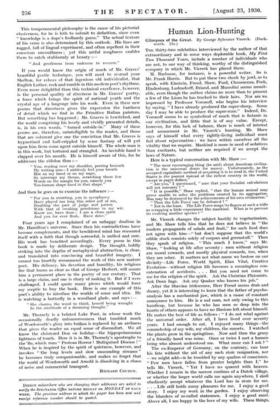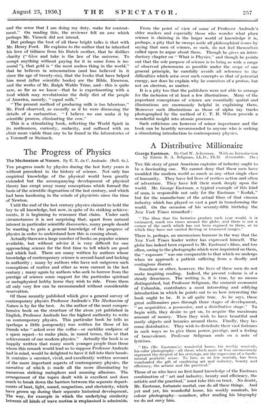Human Lion-Hunting
Glimpses of the Great. By George Sylvester Viereck. (Duck- worth. 21s.) THE thirty-two celebrities interviewed by the author of that extraordinary and in some ways deplorable book, My First Two Thousand Years, include a number of individuals who are not, to our way of thinking, worthy of the distinguished company in which Mr. Viereck has placed them.
M. Barbusse, for instance, is a powerful writer. So is Mr. Frank Harris. But to put these two cheek by jowl, so to speak, with Einstein, Freud, Shaw, Ford, Clemenceau, Foci:, Hindenburg, Ludendorff, Briand, and Mussolini seems unsuit- able, even though the author claims no more than to present a few of the Lions he has tacked to their lairs. Nor are we impressed by Professor Voronoff, who begins his interview by saying, " I have already produced the super-sheep. Some day I may be able to produce the super-man." Indeed, Dr. Voronoff seems to us symbolical of much that is Satanic in our civilization, and little that is of any value. Except, however, for this lack of balance, there is much of interest and amusement in Mr. Viereck's hunting. Mr. Shaw says of himself what every rightly-living individual must feel about rejuvenation : we have within ourselves all the vitality that we require. Mankind is more in need of sedatives than excitants, but neither arc required if we accept the laws of Nature.
Here is a typical conversation with Mr. Shaw :—
" The most encouraging thing (he said) about American civiliza- tion is the universal desire for money. Unfortunately, as the accepted capitalistic method of acquiring it is to steal it, the United States is the poorest instead of the richest country in the world, except in paper dollars."
" Are you," I questioned, " sum that your Socialist calculations will not miscarry ? " " It is possible," Shaw replied, " that the human animal may prove unable to solve the problems created by its aggregation. Man may be destroyed by the achievements of his own civilization."
" Then the Life Force can be defeated ? "
" Not in the least. The Life Force snaps its fingers at such a trifle as scrapping a little experiment like mankind. What is to prevent its evolving another species ? "
Mr. Viereck changes the subject hastily to vegetarianism, and Mr. Shaw tells him that he does not believe in "the modern propaganda of salads and fruit," for such food does not agree with him—" but don't suppose that the world's edible stock consists solely of corpses and greenstuff." Than they speak of religion. " This much I know," says Mr. Shaw, " looking at life after seventy : men without religion are moral cowards, and mostly physical cowards, too, when they are sober. It matters not what name we bestow on our divinity—Life Force, World Spirit, Elan Vital, Creative Evolution—without religion life becomes a meaningless con- catenation of accidents. . . . But you need not come to ine for the religion of the spirit. Ask the Christian Platonists. Ask Dean Inge. Ask any Quaker who knows his job."
After the Shavian iridescence, Herr Freud seems drab and dreary, yet it is interesting to learn that the father of psycho- analysis has a mechanical jaw, which is a cause of constant annoyance to him. He is a sad man, not only owing to this handicap, but because he who has seen so deep into the hearts of others appears to have no illusions left about himself. He makes the best of life as follows : " I do not rebel against the universal order. After all, I have lived over seventy years. I had enough to eat. I enjoyed many things—the comradeship of my wife, my children, the sunsets. I watched the plants grow in the springtime. Now and then the grasp of a friendly hand was mine. Once or twice I met a human being who almost understood me. What more can I ask ? "
The ex-Emperor of Germany, on the contrary, can bear his fate without the aid of any such stoic resignation, nor —we might add—is he troubled by any qualms of conscience. " Few men have fallen from greater heights than I," he tells Mr. Viereck, " Yet I have no quarrel with heaven. Whether I remain in the narrow confines of a Dutch village, or whether the larger world calls me again anywhere, I shall obediently accept whatever the Lord has in store for me. . . Life still holds many pleasures for me. I enjoy a good story. I enjoy my work in the garden. I enjoy observing the blunders of so-called statesmen. I enjoy a good meal. Above all, I am happy in the love of my wife. These things, and the sense that I am doing my duty, make for content- ment." On reading this, the reviewer felt an awe which perhaps Mr. Viereck did not intend.
But perhaps the best of all these bright talks is that with Mr. Henry Ford. He explains to the author that he inherited his love of tidiness from his Dutch mother, that he dislikes charity (" Give and take is the law of the universe. To accept anything without paying for it in some form is im- moral "), that gold is " the most useless thing in the world," that he believes in reincarnation (and has believed in it since the age of twenty-six), that the books that have helped him most (after scientific books) are the Bible, Emerson, and the works of Mr. Ralph Waldo Trine, and—this is quite new, as far as we know—that he is experimenting with a food which may revolutionize the daily diet of the people of America, namely, " equal milk."
" The present method of producing milk is too laborious," Mr. Ford observed, as casually as if he were discussing the details of a carburettor. " I believe we can make it by scientific process, eliminating the cow."
This is a stimulating book, reflecting the World Spirit in its restlessness, curiosity, audacity, and suffused with an elixir more viable than any to be found in the laboratories of Voronoff or Steinach.

































 Previous page
Previous page